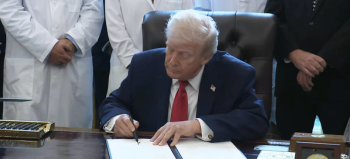
Bridging the Gap Between Patient and Medical Cannabis: One Nurse Steps Up to the Challenge
A major focus area when it comes to medical cannabis is patient and healthcare education, or rather the lack of that education and rampant misinformation. When Megan Mbengue, BSN, RN, CHPN, saw this gap in educational resources firsthand for people who are looking to use cannabis as a treatment, she decided to launch Trusted Canna Nurse with a mission to break stigma through education. Voted a Cannabis Nurse Entrepreneur of the Year by Cannabis Nurses Networks in 2022, Mbengue and her team offer cannabinoid education, consultations, and a line of products for the spectrum of chronic illnesses. In this interview, Mbengue shares how and why she provides guidance as a cannabis nurse for symptoms of conditions such as ADHD, cancer, autism, chronic pain, and more. She also describes the difficulties presented by the lingering stigma of cannabis and explains her hopes for the role of nurses in medical cannabis.
Can you tell us about your background and experience? What was the catalyst for starting your own cannabis education business?
Megan Mbengue: I’ve been a nurse for 10 years. I started my career working in oncology and bone marrow transplant at Johns Hopkins Hospital. I’m nationally certified in three specialties, the most recent being hospice and palliative care. I had a hospice patient last year who was having seizures and was unresponsive to five different seizure medications. I knew cannabis could help, but I had no idea what to give, how to dose, or where to start. I saw a need for a local expert who knew both the medical side and the cannabis side, and I decided I wanted to be that expert. I started going to conferences, webinars, online courses, and I’m currently in graduate school, working towards a master of science in medical cannabis therapeutics from Pacific College. During that time, I started a business as a cannabis nurse educator.
How do you bring together your diverse nursing experiences and background to guide each person’s individual journey with cannabis?
Mbengue: The cannabis expertise is only part of what I offer. The actual nursing part is what has made me the compassionate educator that I am. Regardless of the specialty, nurses are responsible for educating patients on their disease and their treatment, so I have years of breaking down challenging medical concepts into ones that patients can understand. I use that experience to educate patients on how cannabis can help with their symptoms.
I’ve also leveraged that by making educational content on social media. I create short cannabis educational videos and explain difficult concepts in ways that people understand.
Why is being a cannabis nurse and educator important to you and your clients? What sorts of challenges do you have to overcome?
Mbengue: With education comes empowerment, and I love being able to educate and empower my patients to take their health into their own hands and make their own decisions. The Western model of medicine strips patient autonomy and reduces health to a symptom and a pill. I teach patients how to tune in to how their body is feeling and medicate appropriately. I teach them how to manage symptoms with and without cannabis.
An interesting challenge is teaching patients how to check in with their body and their emotions, so they can learn how to medicate appropriately for what they’re feeling. I help them develop a mind-body awareness to help them learn to self-medicate effectively.
You offer lectures, workshops, webinars, products, a blog, and are active on social media. How receptive have audiences been to cannabis education? What are people most eager to learn?
Mbengue: I’ve had a very positive experience creating cannabis educational content on social media. People are thirsty for accurate information from a trusted source. They’re thirsty for validation that cannabis really does help their attention-deficit/hyperactivity disorder (ADHD) and other conditions. They want to know how cannabis will help their cancer or their depression. People are thirsty for facts about cannabis.
I made it to 77,000 followers on TikTok before getting mass-reported and permanently banned over calling out synthetic cannabinoids. TikTok was extremely restrictive, and it was a challenge to actually promote my business and my products. Instagram and Facebook are far less restrictive, and I’ve had a lot of success educating and generating sales on those platforms.
What has been your biggest “Aha” moment so far?
Mbengue: Seeing this graph at a conference and really visualizing how cannabis is less harmful than substances we consume daily or that are prescribed daily. This graph (1) made me question everything I had been taught in school about cannabis and other drugs. Some of the substances we were scared away from are actually safer than substances we’ve normalized.
You seem sensitive to the care and needs of patients who are children or older adults. What are some of the unique methods you use when approaching care with cannabis for these different patient populations?
Mbengue: I approach pediatrics and seniors with both objectivity and empathy. No parent wants to give their kid anything that could harm them, and we’ve been told for 100 years that this plant is harmful. Many parents also want to stay away from pharmaceuticals and are opting for natural methods to help their kids. I present them with existing evidence we have on the condition as well as my own personal experience. Again, it’s about educating them and empowering them to make the best decision for their children.
When it comes to seniors, many of them are on multiple medications and are still looking for relief. They also need clear direction on what to take and how much, so I try to do that while also empowering them to learn how to dose themselves.
Your consultation offerings range from product questions to group sessions and consultation on severe illnesses. Why was that range of options important for you to offer?
Mbengue: This is actually part of the business model that we just changed. In my experience, patients don’t want to pay to learn what to take in individual or group sessions. They just want to be told what will work best for their symptoms, and they’ll purchase the product. Since I have quality products to offer, we just launched free product guidance calls to give recommendations for those who are just looking for help for a single issue. We have the consultations for those with complex issues, such as those wanting to cut down their cannabis use or those needing help with children.
What are the most common questions you and Trusted Canna’s pharmacist are asked for help with?
Mbengue: The most common question is, “what would help me with x…” or, “what can I give my kid for x?”
We have a pharmacist on board to help with medication interactions so that we can safely guide our patients, especially the seniors who are on multiple medications.
Where do you see the areas for the most growth for medical cannabis in the US? Do dispensary partnerships with cannabis nurses offer a significant solution?
Mbengue: I firmly believe that medical professionals, specifically nurses, are one of the most underutilized resources in the industry. Who better to help guide a patient in their cannabis use than someone who knows both the medical side and the cannabis side and who’s been voted the most trusted profession in the country for 20 years now?
There’s a huge gap in education between the plant and the consumer. Budtenders can be helpful, and some are more knowledgeable than others, but in a recreational market, the medical patient is often forgotten and left to figure it out themselves. Also, there’s zero guidance on the hemp side, other than dismissal from medical professionals. Education of patients and healthcare providers would not only stimulate more growth in the industry, but it would foster more credibility and less stigma.
What are your plans for future growth?
Mbengue: We have a lot of plans! On the product side, we’re currently launching an entire tetrahydrocannabivarin (THCV) line, including full spectrum THCV oil, gummies, and mints! We’re currently testing suppositories on some patients with endometriosis and pelvic pain. On the education side, we’re about to start reaching out to health care facilities, pitching educational programs, and offering continuing education unit credits (CEUs) for nurses. Since we’re vendorized with the Veterans Affairs (VA), we’re also working on procuring government contracts to teach VA nurses about cannabis.
Do you have any final advice or insights you’d like to share?
Mbengue: Thank you so much for interviewing me! I’m really excited to be at what feels like the ground floor of cannabis going mainstream. This of course wouldn’t be possible without the base that was laid by all of those who came before me, and I’m so thankful to be able to talk so freely about cannabis because of them.
Reference
Newsletter
Unlock the latest breakthroughs in cannabis science—subscribe now to get expert insights, research, and industry updates delivered to your inbox.




